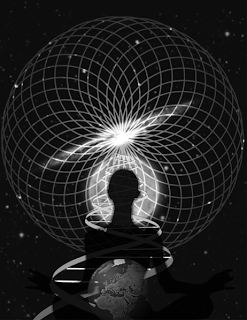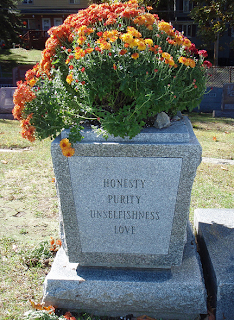 |
| "We found the Great Reality deep down within us. In the last analysis it is only there He may be found." (Alcoholics Anonymous, p. 55.) |
The key is in our ability to "respond" to whatever the situation is (implying a sober, second 'thought') rather than "reacting" to it (implying immediate, instinctive 'action' based on our first thoughts about the situation) Fortunately, the Twelve Steps give us several tools that help us do this, thereby allowing us to operate under the care and protection of a Power greater than our "selves" rather than under our own "steam."
First, and foremost, we have Step Three and the Serenity Prayer. In the "Big Book' of Alcoholics Anonymous' taking the Third Step for the first time is quite simple: You say the prayer, then pick up pen and start writing out your moral inventory. However, having gone through Steps Four to Step Nine, we are required to "practice" Step Three (as well as Step Ten) on a continuous basis: But how do we practice Step Three effectively, so that what we 'do' or 'say' (or 'don't do' or 'don't say') - i.e., the exercise of our will, or deciding faculty - is based on "God's will" rather than on the imperative drives and instincts of the ego and our egoic, 'self-will'?
Plan A: Step Three and the Serenity Prayer
In the Twelve Steps and Twelve Traditions (at pages 40-41) we read that each time we are emotionally disturbed or indecisive (i.e., we don't know what we should either 'say' or 'not say, or 'do' or 'not do'), we can (if we so choose) "stop," "pause," ask for "quiet" and say the Serenity Prayer. (Of course, this means we need to 'stop' and pause' the raucous thoughts of the "ego' or "stream of consciousness" rather than slamming on the brakes when frustrated over the traffic on the freeway. We are always dealing in Step Three with the level of our consciousness - the "self," or ego-consciousness, versus the "innermost Self" or "God-consciousness,"as our "more religious members call it.")
 To effectively "stop" and "pause" the ego (or what Bill elsewhere calls "that painful inner dialogue"), however, it is essential that we take periods of "quiet time" in the morning and evening in order to find the place of "quiet" within our consciousness (in this instance, God-consciousness) that we can then retreat to when our emotions are running wild or we just don't know what to say or do in the situation we are presented with. This is an absolutely essential component of "the daily maintenance" that we need to "maintain our spiritual condition."
To effectively "stop" and "pause" the ego (or what Bill elsewhere calls "that painful inner dialogue"), however, it is essential that we take periods of "quiet time" in the morning and evening in order to find the place of "quiet" within our consciousness (in this instance, God-consciousness) that we can then retreat to when our emotions are running wild or we just don't know what to say or do in the situation we are presented with. This is an absolutely essential component of "the daily maintenance" that we need to "maintain our spiritual condition."Our instinctive emotions, if used effectively, can be a wonderful tool - a biological 'early warning device' - that allows us to know that our thinking (the "ideas" that drive our "feelings," and our" "attitude, or the habitual way we think and our thought patterns) has once again gone askew. To correct our ideas and attitude, and to rid ourselves of the toxic emotions that would otherwise cause us to "react" rather than "respond" to our circumstances, we consider and recite the Serenity Prayer.
First, we ask for the "serenity," which is really an affirmation and invocation of the presence of a "conscious contact" in our mind with a Power that is greater than our egoic selves - i.e., we invoke, or turn our mind, to our "higher, God-consciousness." To do so, we need "courage" in facing whatever our circumstances are at that moment. "Courage" - from the French "couer," meaning "heart" - is the process of "letting go" of our self-absorbed, ego-consciousness and "letting God," or the God-consciousness that is at the center, or 'heart' of our being, emerge so that we may "respond" with the right action, rather than "reacting" from the ego-powered and most-often misguided and fear-driven drives and instincts. Finally, the "wisdom," which we have already gained from the cumulative, day-after-day practice of the Twelve Steps (particularly Steps Three and Step Eleven) is simply the knowledge that there are, in essence, two "selves" - the narrow "self" which is the "ego," and the expansive, all-inclusive "Self" which is an integral part of, and acts as an agent of, "the God of our understanding." (After all, if God is truly "everything or nothing," we are a part of that Whole, in which "we live, and move, and have our being.").
Plan B: The Four Absolutes
While the Serenity Prayer is best suited to, and is essential for, the moments in life when we are emotional disturbed (i.e., consumed by 'fear-activated' pride, greed, anger, lust etc.), the little known Four Absolutes are immensely helpful when we really "do not know what to do" - when we are truly "indecisive." (Note: This is different from knowing what the right thing to do is - like promptly admitting when we are wrong - but not wanting to do it!)
 |
| The "Four Absolutes" at Dr. Bob's graveside. |
In the "Co-Founders" pamphlet, Dr. Bob explains that when he did not know what to do he would run his ideas through the Four Absolutes (honesty, purity, unselfishness and love) and usually they would provide him with the answer of what to do - based on God's will and not his own. If still indecisive, he said, he would then run the potential scenarios past a friend that was better positioned to make such a decision. (Note to the A.A. "purist" - aside from the "Co-Founders" pamphlet, the Four Absolutes are discussed in "Doctor Bob and the Good Old-Timers," as well as in "Pass It On!," all of which are Conference-approved A.A. literature.)
The four Absolutes, themselves, are very easy to quickly and effectively use. In respect of 'Absolute Honesty' - the first of the Four Absolutes - one asks oneself, in respect of what one is about to 'say' or 'do' (or 'not say' or 'not do'), "Is it true or is it false?" In respect of Absolute Purity, one asks: "Is it right, or is it wrong?" In respect of Absolute Unselfishness, putting oneself and one's own interests out of the situation and completely out of mind, one asks: "How will this affect the other fellow?" And, in terms of Absolute Love, one asks: "Is it beautiful, or is it ugly?"
In the "Co-founders" pamphlet, which sets out the ever-practical and humble Dr. Bob's last major public talk, he says this (in part) about the history, application and usefulness of the Four Absolutes:
"The four absolutes, as we called them, were the only yardsticks we had before the Steps. I think the absolutes still hold good and can be extremely helpful. I have found at times that a question arises, and I want to do the right thing, but the answer is not obvious. Almost always, if I measure my decision carefully by the yardsticks of absolute honesty, absolute unselfishness, absolute purity, and absolute love, and [if] it checks up pretty well with those four, then my answer can't be very far out of the way. If, however, I do that and I'm still not satisfied with the answer, I usually consult with some friend whose judgment, in this particular case, would be very much better than mine. But usually the absolutes can help you to reach your own personal decision without bothering your friends.""Four Absolutes" pamphlets can still be purchased through the Cleveland District's Central Office (here), or can be downloaded from a number of independent websites (here and here).
[Reminder to myself: "Thy will, not mine, be done!"]
No comments:
Post a Comment